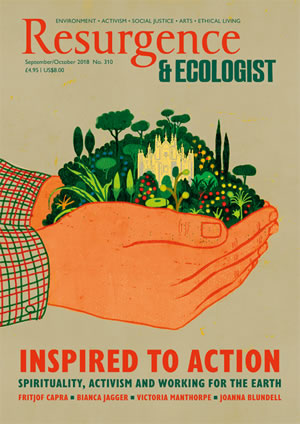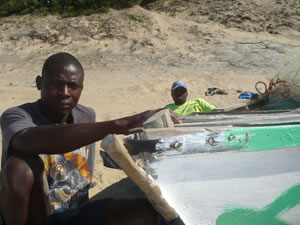“It was awful. Worst thing I’ve seen in my life. The fish hid away for weeks after the cyclone.” Albert Chahide isn’t keen to talk. Later today there’s a meeting of the 60-strong fishing cooperative he heads, and he has metres of gill nets to repair. Another fisherman strides past. They greet each other. Manuelo Marcelino, Mozambique’s first dive master, is more eloquent: “The cyclone was terrifying, my children were screaming, and I really didn’t know what to do. The roof of the house, which is corrugated iron, was being torn off. It lasted 24 hours, and then it took months to sort out. We’re still saving to get the house finished.”
The two fishermen are leading the charge to change the way this community views the ocean – to stop seeing it as a vast restaurant and start finding ways to fish differently.
Some 50% of Mozambique’s protein is provided by fish. Marcelino and Chahide recognise how much the fishermen understand this ocean – they read it without charts, and they use tiny clues (the colour of water, surface activity) to tell them where the manta and shark are. They have deep knowledge of how fish breeding has changed over the years. They are encouraging fishermen to view the sea as important in its own right and shift the whole paradigm.
The stretch of coast in Zavora is below Mozambique’s famous tourist area, Tofo Beach and Inhambane. Tourism has grown exponentially since the end of the civil war in 1994, but Mozambique is still one of the poorest countries in the world. Access to Zavora is difficult, and none of the villagers have electricity or internet. Cassava, sorghum, maize and fish are the staples. Cars are rare apart from the local pick-up truck piled high with people and their produce. Tourists, mostly South African, drive their bakkies (4×4s) onto the beach towing their speedboats and occasionally hire local fishermen as guides to spot the big fishing trophies tuna and kingfish.
Local fishermen are ambivalent about their rivals. “It’s a good income for a day if I’m asked to skipper. Then I don’t have to fish. But the tourists also scare all the fish away with their motorboats. We’re fishing in tiny boats, all competing for the same shrinking fish. The Chinese trawlers” – he stops to gesture out to the horizon, where a large boat is silhouetted – “they take everything anyway. We’re struggling.”
Over-fishing is well catalogued. The alleged marine police haven’t been seen in several years. Zavora, which is vulnerable to extreme weather events, also faces social poverty, low levels of education, and bad transport. What might be statistics about rising sea levels and hurricanes seen from Southampton, Surrey or Scotland mean life or death here, which makes it a perfect place for Marine Action Research (MAR), one of just a handful of research institutes trying to pull off an insanely hard act – to address the needs of local fishermen and tackle climate change.
This approach isn’t completely new: Blue Ventures in Madagascar, and Chumbe Island in Tanzania (a finalist for the 2018 Tourism for Tomorrow awards) created the templates. Blue Ventures sees an implicit link between fishing, marine wellbeing, health and family planning, and argues that a holistic approach is the best way forward. (See Issue 306, Family Planning Makes for a Healthy Ecosystem).
Nakia Cullain took over as director of MAR in 2016. It occupies a slightly gloomy solar-powered house, with a small room with some microscopes and lots of files, and a large room with charts of tides and hand-drawn visuals explaining rainfall, carbon capture and global wind patterns.
“This is a shark hotspot,” Cullain explains. “It’s one of the places in the world that has the highest concentration of sharks – all of them: hammerhead, great white, black-, grey- and whitetip, Zambezi, leopard. The threatened species are here in great numbers. I wanted to work here to keep one of the largest shark populations safe and alive. Of the fish stocks assessed here, 35% are fully exploited and 28% are over-exploited. Some 50% of the shark species are under threat. I use volunteers to monitor sharks, mantas, nudibranchs, seahorses and whales. They pay and help out with research and get to dive some of the most interesting and difficult sites in the world. At the moment that’s how we’re (just) surviving!”
Fortunately most fishermen believe that shark fishing is illegal – although actually only finning is, and enforcement is non-existent.
What Cullain hadn’t reckoned with were enormous weather events – cyclones like Dineo, which hit in February 2017, and the ensuing chaos for people who lost everything. Unlike the Indian Ocean, which is warmer, the Atlantic is brutal, with waves at times over 6 metres high. Sea levels and acidity are rising. Drownings are common, yet fishermen feel obliged to keep going out. Cullain also hadn’t realised how entrenched the methods of gill-net fishing are (using a 100–700-metre net that scoops everything out and is disastrous for marine life) and how well-organised the fishermen are, with cooperatives and elaborate rules for dividing the catch to make sure everyone eats.
None of the local communities had science classes, or even a basic understanding of global weather patterns, geography and climate change. Cullain says: “It’s incredibly challenging. I start small. I explain the problem of carbon emissions from the global north – from my country! I try and explain what carbon is, how it contributes to global warming, and how the effects are felt here. It’s very slow, very simple.”
Several thousand miles up the coast, Chumbe Island is doing well. The fishermen who once plundered the dwindling fish stocks are now employed as guides and educators, and local schoolchildren regularly visit the island as part of their curriculum. Sibylle Riedmiller is a very determined woman who had 20 years of development experience before she started Chumbe Island Coral Park in the 1990s.
Even with fluent Swahili it was tough, Riedmiller recalls. “There was little awareness about what corals are and how important they are for the ecosystem. Corals are called ‘rocks and stones’ in Swahili – very few people here in Tanzania knew that coral is something living. Even senior people were completely unfamiliar with the idea of marine tourism.”
I ask why it was successful. “We introduced the concept of marine tourism to government and showed fishermen that ‘no take’ zones give fish populations time to recover. They could see the results in front of them. They had more fish to eat. More income.”
In Mozambique, marine tourism is yet to take off. Largely it caters for the luxury end of the market, demand for pristine beaches and excellent diving. This might work in Cullain’s favour. Tourists bring money and create markets.
Back at Zavora, Marcelino is planning local beach cleans and educational work with local schools. He’s supported by his friend Francisco Hiron, a waiter at Zavora’s only restaurant. Both speak English, Shangaan, Portuguese and their local language. “It is written in the Bible – it is God’s will. We knew that there was going to be a storm of terrible repercussions. It is our punishment for betraying God.” Hiron surveys the empty restaurant. What about, instead of corrugated iron, using traditional makuti (thatch) roofs, which allow the winds to blow through and are much more storm-proof? “No, we don’t like those roofs. They’re not modern.”
Cullain’s neighbour Veronica Bata is a sangoma (traditional healer, psychiatrist and social worker). She says corrugated-iron houses are better, even though they were all destroyed in the storm and those made of mud and thatch were not. She shows me her makuti roof. “Look at this. Tatty. Rubbish. OK, yes, the corrugated iron blew off completely, but I still don’t want this traditional rubbish. Why did the cyclone happen? We are not being aligned with Nature, not being properly attentive to our ancestors…”
Marcelino thinks there are ways to fuse local attitudes like Bata’s with hard, western science. “We have to work with local attitudes, understand what people think, and then gradually discuss. But also, I know from learning to understand the ocean that it’s really helpful to understand tides, global temperature flows, where all this rubbish comes from that we get on the beach, and why.”
Increasingly, the scientific community in the global north agrees with him – local communities need to be involved from the start. New methods of data collection that use oral traditions and adapt to non-literate populations need to kick in. Much more recognition of how people use their marine resources, why and how they think about them is starting to happen.
Cullain is buoyant. “I’ve just received a huge funding grant to monitor and tag sharks and mantas. This is a complete game-changer – it means I can offer fishermen money, something real, helpful and scientifically meaningful for us; it’s a way for micro and macro to mesh. We’re also working with the Swedish NGO Rare on no-take zones. It’s taken four years!”
Says Marcelino: “Westerners tend to romanticise our community bonds – actually, here they’re pretty weak and we’ve got to really work at them. But we’ll get there. And I think with our resilience, our local knowledge of what has happened here, and some funding and scientific expertise from the west, we will overcome, we will win!”







